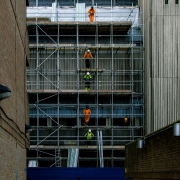More than three-quarters (76%) of senior industry decision-makers at large UK firms have high expectations for the use of AI in construction
New research commissioned by IFS found that more than two-thirds (68%) of construction decision-makers think their industry is adopting AI at a faster rate than others.
The findings highlight the increasing optimism of the sector about the potential of AI.
31% of the survey sample indicate that executives and board members have high expectations for AI’s ability to enhance market knowledge.
AI will also boost product or service innovation and create consistent growth opportunities, according to 29% of the survey respondents.
While 76% of leaders report a high level of readiness for AI adoption in construction, concerns persist about the quality of AI resources, especially human skills.
Over a third (36%) rate their team’s AI skills as merely passable, highlighting a gap between AI aspirations and current capabilities.
Equally concerning, more than a quarter (27%) indicate that upskilling is not a priority.
The report found that 36% of firms have developed clear strategies and are seeing tangible results from their AI initiatives. This demonstrates the benefits of a well-planned approach.
Another 31% are in the process of gathering proposals for pilot projects, highlighting a proactive stance towards exploring AI applications.
The remaining 31% are still in the research phase, indicating a cautious yet determined effort to understand the potential of AI in the construction industry.
Despite concerted efforts, almost two-thirds (64%) of respondents believe it will take one to three years for AI to make a significant impact on their organisations.
42% of respondents indicated that their legacy-based technology landscape is hindering their progress in adopting and deploying AI.
Additionally, 41% expressed uncertainty about potential AI use cases within their business, underscoring the need for a clearer strategic direction.
Kenny Ingram, VP of construction and engineering at IFS, said: “While the enthusiasm for AI in the UK construction sector is clear, our research shows that there are significant challenges to overcome. The legacy technology landscape and the need for upskilling are potential obstacles.
“However, with a strategic approach and investment in the right resources, these barriers can be addressed effectively.”



